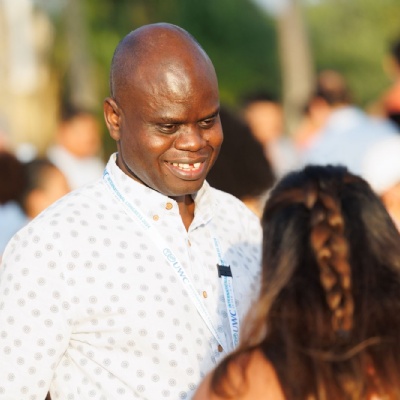Developing sustainable water solutions in South Sudan

Justin Tata (UWC Red Cross Nordic, 2000-2002)
Justin Tata's journey from a student at UWC Red Cross Nordic in Norway to a leader in sustainable water management and community development in South Sudan is a testament to the transformative power of education. His story reflects a deep commitment to addressing critical issues in his homeland, particularly the management of water resources.
A curriculum focused on sustainable solutions
Justin's time at UWC Red Cross Nordic played a key role in shaping his approach to social and environmental challenges. "My extended essays in physics revolved around the dynamics of water," Justin recalls. This early interest in water dynamics grew through collaborative projects with students from various academic backgrounds, such as chemistry, environmental systems and social work. These experiences showed Justin how different fields needed to work together to solve environmental problems and set the stage for his future work.
Building a foundation in environmental studies
After UWC, Justin studied at the College of the Atlantic in the United States, focusing on human ecology and architecture. He learned how human interactions within built and natural environments could be optimised for sustainability. He then gained practical experience at an architectural firm in Boston.
Justin's academic and professional experiences led to a global scholarship from Boston University’s International Honours Programme, Cities for the 21st Century, allowing him to study the ecology of cities worldwide. This exposure to diverse urban environments, from New York to Beijing to Auckland, gave him a broad perspective on how cities function and the crucial role of environmental and economic factors.
Bringing knowledge back home
Armed with this wealth of knowledge, Justin returned to South Sudan with a clear vision: to apply his expertise to the challenges facing his country. In 2016, he became involved with the Eastern Africa Land Administration Network (EALAN), focusing on curriculum development and policy research. This role deepened his understanding of land issues and highlighted the significant impact of water management on transportation and infrastructure development.
South Sudan's frequent floods and droughts pose severe challenges to transportation infrastructure, often washing away bridges and roads. These environmental issues exacerbate displacement, land conflicts and food shortages. Justin realised that addressing water management could mitigate many of these problems, providing stability and promoting development.
Innovating for sustainable water management
Justin's innovative approach combines traditional and modern techniques for sustainable water management. He proposed using earth dams to collect surface water and underground channels to transport water over long distances. These technologies, if implemented effectively, could address both flooding and drought, providing a reliable water supply for agriculture and daily use.
By training and employing local young people in these technologies, Justin aims to create a sustainable model that empowers communities and reduces displacement. This approach not only addresses immediate water management issues but also promotes economic activities, enhances food production, and allows for infrastructure development without the constant threat of flooding.
Overcoming challenges
Justin's journey has not been without challenges. His initial attempts to introduce innovative urban planning ideas, such as creating public spaces along the Nile in Juba, were met with resistance from local authorities. Despite these setbacks, Justin remained undeterred. "I had to believe in myself," he says. "If I don't believe in myself, nobody will buy into my ideas." This resilience is a hallmark of his approach, enabling him to navigate bureaucratic hurdles and persist in his efforts to bring about change.
A vision for the future
Justin's work has the potential to create significant ripples of change. By addressing the root causes of flooding and drought, he aims to tackle the underlying issues that contribute to conflict and displacement in South Sudan. His vision includes not only sustainable water management but also creating economic opportunities for young people and women, fostering stability and growth.
"With 78% of our population under 24 and only 13% literate, most of our youth aren't involved in community development. Inspired by my UWC experience, I asked myself: How can I help build cities with my people? If successful, my approach will educate, train, and employ the youth, using technology to manage water and create a more sustainable future."
Justin's commitment to sustainable water management and community development in South Sudan highlights the impact one individual can have on addressing complex social and environmental challenges. Through his innovative approaches, Justin continues to build a brighter future for his homeland.
